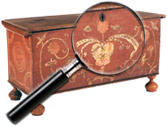|
|
The International Market for Meteorites
For a discussion of the market of meteorites, collectors and values see: http://www.thenakedscientists.com/HTML/articles/article/the-international-meteorite-market/
Reference note by p4A editorial staff; 05.12.
Hematite Artifacts
Hematite is the mineral form of iron oxide comprising up to 70 percent iron. It is colored black to gray, brown or red, usually with a rust-red streak. The mineral takes its name from the Greek, “haimatites”, which we translate as bloodlike, thus the name alludes to the vivid red color of the iron powder.
Hematite is harder than pure iron, but much more brittle. Large deposits of hematite are found in [...] Click here to continue reading.
The Eocene Epoch
The Eocene epoch is the second oldest of the five major epochs of the Tertiary period of the Cenozoic era, or approximately 58 million years ago.
Benjamin Perley Poore
Benjamin Perley Poore (1820 to 1887) was a significant early collector of American antiques. A writer by trade, Poore was born near Newbury, Massachusetts to parents Benjamin and Mary Perley Poore. The family estate called Indian Hill became the showcase for his eclectic assemblage of antiques.
As a youth Poore was influenced by trips to Europe and was especially fascinated by the old Scottish castles and manor houses. He later sought [...] Click here to continue reading.
Only eight percent of all meteorites that fall to earth are iron meteorites, ninty-two percent are stony meteorites. Iron meteorites are fragments of the metal cores of asteroids from the asteroid belt between Mars and Jupiter. Nickel frequently accounts for the second largest portion of iron meteorites.
Boot of Cortez Gold Nugget
(courtesy Heritage Auction Galleries)
The austere and forbidding Sonora Desert of the United States and Mexico regularly experiences some of the most extreme weather in the Western Hemisphere. Daytime temperatures often exceed 125 degrees in the shade even as blast-furnace winds swiftly strip life-sustaining water from the few men and animals tough enough and wily enough to make a living in this land of stark, unforgiving beauty. [...] Click here to continue reading.
Artiodactyla Order
Artiodactylae was one of several animal groups to arise in the Eocene or Pleistocene epoch. It included such even-toed, hoofed mammals as pigs, deer, sheep, camels, hippopotamuses and goats.
Types of Ivory and the Legalities of the Ivory Trade
What is Ivory?
Strictly speaking, the term “ivory” refers only to the whitish-yellow material that makes up the tusks of mammals, such as elephants and walruses. Other related materials, such as that which comprises the teeth of sperm whales and, upon occasion, hippopotamuses, is often called ivory, but technically, is not. Two other related types of material are the ivory from the East Indian [...] Click here to continue reading.
|
Recent Articles
- Charles Alfred Meurer – American Artist & Tromp L’Oeil Artist
- Sendak, Maurice – American Artist & Writer
- Godie, Lee – American Artist
- Davis, Vestie – American Artist
- Bartlett, Morton – American Artist
- Mackintosh, Dwight – American Artist
- Evans, Minnie Jones – African-American Artist
- Mumma, Ed (Mr. Eddy) – American Artist
- Nice, Don – American Artist
- Savitsky, John (Jack) – American Artist
- Gordon, Harold Theodore (Ted) – American Artist
- Dial, Thornton – African-American Artist
- Doyle Sam – American Artist
- Johnson, Lester Frederick – American Artist
- Finster, Howard – American Artist
|
|
